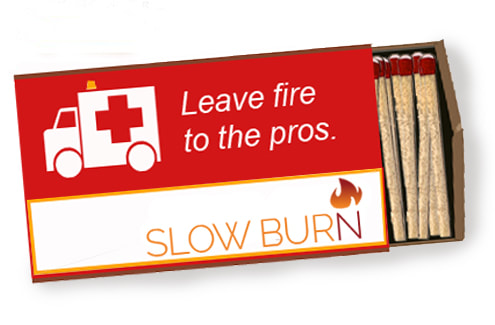 A PLACE WHERE BRANDING & MARKETING OVERLAP WITH HOLLYWOOD Yes, I'm a little behind the curve. No matter. It was worth the wait. You may agree. Or not. Over the weekend, The Fabulous Honey Parker and I saw The Big Short. If you don't know this film, it's based on the book of the same name, documenting the men who shorted the sub-prime mortgage bubble. The film has won a slew of awards, from Oscar to AFI to BAFTA to Critic's Choice to plenty you've probably never heard of. Here's what we find really interesting about The Big Short. IT'S DESIGNED TO MAKE YOU FEEL ONE THING ABOUT "THE SYSTEM" Yes, "feel." One thing. And it does that quite well. The film makes you laugh. It makes you aghast. But mostly, it's a calculated to make you feel furious. It really leaves you with little alternative. Unless you're a sociopath. To drill down a bit, director Adam McKay wants you to not only feel furious about what happened in the mortgage meltdown, but to feel like you need to pay more attention to things that matter--as opposed to paying attention to our celebrity-heavy, 24-hour news cycle that typically says little of substance. McKay says of his film, "The most important thing to me is our popular, white-noise culture is telling you this [topic] is boring, other people are dealing with it, and by the end, I want you to feel contradicted, 'This is not boring.'" MR. MCKAY WANTS YOU TO TAKE ACTION Which is exactly what we as marketers and entrepreneurs want from marketing, right? The big picture of The Big Short aside, there is also some micro take-away that left me ruminating about what we all do. Some things said in the movie were mentioned with an eye towards the housing-bubble insanity-- But were equally applicable to branding and marketing. Here now, in no particular order, some of those personal reflections to maybe make you feel better (or worse) about the little jobs we do in pursuit of lucre. ABOUT THAT FRAUD... Steve Carrell's character, the dysfunctional hedge-fund manager Mark Baum, says: We live in an era of fraud in America. Not just in banking, but in government, education, religion, food, even baseball... What bothers me isn't that fraud is not nice. Or that fraud is mean. For fifteen thousand years, fraud and shortsighted thinking have never, ever worked. Not once. Eventually you get caught, things go south. When the hell did we forget all that? I thought we were better than this, I really did. Hey, ain't that a cheery thought for a Tuesday morning! Especially if you work in marketing or advertising, you've heard someone say that the advertising business is the institutionalized perpetration of fraud. Which is, frankly, BS. DONE WITH INTEGRITY, ADVERTISING CAN EVEN BE AN HONORABLE AND RIGHTEOUS PURSUIT No, it isn't up there with solving third-world hunger. But not everyone can be Mother Theresa. And advertising can be used in the support of people like Mother Theresa. Both The Fabulous Honey Parker and I have done as much. And in the bigger picture, the kind of advertising that constitutes lying to people to get at their wallets is ultimately useless. Especially if the product being sold is lousy, any skilled advertising created on its behalf only accelerates the product's failure. This week, Slow Burn is talking with a gentleman about marketing a kind of software development that can speed an enterprise's project by two thirds and cut their costs one third. In an age of shrinking budgets and Americans losing their jobs to offshoring, marketing this service could help a business be more competitive and profitable and help domestic IT people keep their jobs. Does creating advertising for that seem like an honorable pursuit? "NO, ADVERTISING IS INSTITUTIONALIZED LYING!" Yep. And the guy who's saying that is probably the same guy who tells a three-year-old there is no Santa Claus. Fraud might pay off in the short term. In the long term, it's a bad tactic and a crappy strategy. Another line from the movie was actually not written by a screenwriter ostensibly quoting a fictionalized hedge fund manager, but was taken from that American literary icon, Mark Twain: "It ain't what you don't know that gets you into trouble. It's what you know for sure that just ain't so." Oh, dear. Yes, advertising is filled with examples of this. SELF-PROCLAIMED EXPERTS OFTEN SPOUT BS ABOUT ADVERTISING "RULES" Rules like, "In a radio commercial, you have to say the advertiser's name in the first 10 seconds and a minimum of three times." Some of my high-ROI producing commercials happily fly in the face of such BS. The only rule is this: as long as you make the prospect care and give him a simple and direct way to respond, there are no rules. Any authority who spouts inane "rules" about creating advertising should be ignored. (Yes, feel free to stop reading right now.) AND THEN, ONE OF THE MORE PROFANE QUOTES OF THE FILM... This will be one of the few times you must endure the F-word here in the screed. I apologize in advance. "Overheard at a Washington, D.C. bar: 'Truth is like poetry. And most people fucking hate poetry.'" That's so much a crystallization of the truth, I dare say that line itself is poetry. Except that it's also not entirely true. People hate poetry when you tell them it's poetry and that it's good for them like bran-flake castor-oil kale juice, and they have to work to understand it. Poetry at its finest is a crystallization of the truth, but it doesn't need to be a form of cultural castor oil. MEGHAN TRAINOR'S "ALL ABOUT THAT BASS" IS MILLION-DOLLAR POP POETRY If you had ever said, "You know what we need is a pop song about positive female body image," you'd be laughed out of the room. But that's exactly what Ms. Trainor wrote. She scored a huge, arguably poetic hit that resonates with people nationwide. And she routinely receives email from girls who thank her for making them feel better about themselves. Yes, arguably, this is part of the cultural white noise that Adam McKay wants us to get past in order to pay attention to the real problems. But that's another discussion. This is about the power of poetry to resonate and get past the brain's gatekeeper to tap into the emotions. Another example: I recently watched a New Zealand sheep farmer recite an original poem about going vegan. As a confirmed omnivore with a distinct appreciation for meat--and as someone who has endured many unpersuasive arguments about veganism--that poem was the first time that I was ever left feeling as if maybe there really is something to be said for pursuing a meatless existence. Done well, poetry pierces the intellect to reach more deeply and resonate more profoundly. AND SO DOES GOOD ADVERTISING--WHICH CAN BE POETRY But that is also another screed. And finally, one of the best lines from the film comes early on, when neurologist, fund manager and self-diagnosed Asperger sufferer Michael Burry is trying to be more consciously socially acceptable, he tries to start a conversation with a job hunter by saying, "That's a nice haircut. Did you do it yourself?" Who but a person with a tenuous grasp on the details of daily reality would ever even ask such a question? I'll tell you who: an entrepreneur. No, this is not an indictment of entrepreneurs at large. But it does echo the absurdist definition of "entrepreneur" that's been floated in this space previously: "Someone who would perform brain surgery on himself if he could figure out how to stay awake during the operation." SOME TASKS ARE BETTER OUTSOURCED And some entrepreneurs can't possibly understand that. Which is why, so often, they assume all their marketing duties themselves without actually understanding anything about it. We've spoken to a fellow who funds tech startups. He has described something very much like this: tech entrepreneurs frequently know just enough to feel good about going out and spending huge amounts of money on pay-per-click advertising that makes zero sense and offers zero return. Would you spend $30,0000 a month to advertise your business without understanding branding theory, advertising strategy or direct response tactics? Yet it happens routinely. These people understand neither the science nor the art of their own marketing, yet blow scads of money prompted by the hubris of "How hard can it be?" thinking. IN THE END, THERE REALLY IS A SIMILARITY BETWEEN ART AND ADVERTISING Let's revisit Wikipedia for our definition of art: Art is a diverse range of human activities in creating visual, auditory or performing artifacts--artworks, expressing the author's imaginative or technical skill, intended to be appreciated for their beauty or emotional power. So, art is emotionally evocative. It makes people feel something. Great art makes people feel something and hangs in The Louvre. Popular art makes people feel something, goes to the top of the charts, and eventually disappears. Advertising art makes people feel something, and inspires them to better their own lives by helping a business owner better his own life. No fraud. No stupid rules by experts. No self-inflicted hairstyles. Just an intelligent and strategic appeal to the prospect's emotional being in a way that is measured and balanced to the sale at hand. Until the fraud hits the fan. Which is ultimately how The Big Short came to be in the first place. You already use your powers for good. Now go see the movie if you haven't already.
0 Comments
|
AuthorBlaine Parker is prone to ranting about any and all things related to brand. In many ways, he is a professional curmudgeon. While there is no known vaccine for this, the condition is also not contagious. Unless you choose it to be so. Archives
February 2022
Categories
All
|
|
© Copyright 2020 Slow Burn Marketing LLC |

 RSS Feed
RSS Feed

